
When I was contracted last month by the PR agent promoting Omnivore’s CD reissue program for the works of Gleaming Spires, it was like having my wish granted by a genie. When they offered an interview with Spire David Kendrick, who was happy to talk about the years spent making Gleaming Spires music and was also the drummer for Sparks and DEVO for a run of their canon… well how could I say anything but yes, please? So recently, one afternoon, I had the pleasure of talking with Kendrick and we get started “below the fold.”
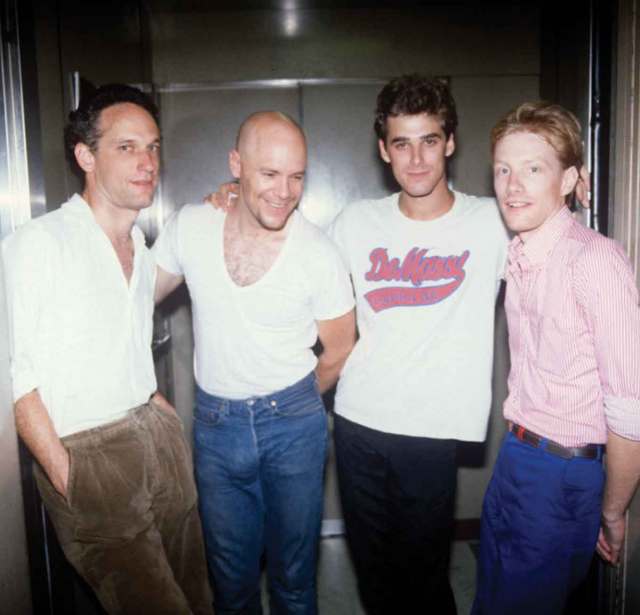
THE REISSUE PROGRAM
PPM: I’ve got to say I’m real excited about the reissue program because here I go writing about the notion of making this stuff on my own. Buying the vinyl. …denoising it and whatever, and all of a sudden…
David Kendrick: I know. I did see that.
PPM: Yeah, here you go…bang!
D: Yeah, and it’s kind of fortuitous. We’ve been kind of working on doing this for quite some time and we finally got all of our rights back to our whole back catalog. And Robbie Fields, the Posh Boy guy, not that much new got done to anything. I just continued on in many bands, other projects. My main personal writing thing has been this ongoing studio project, called The Empire Of Fun that keeps making, for want of a better word, concept albums dealing in science fiction and crime, fictitious islands. Anyway, we meet all kinds of people on there. We actually do handmade things. I guess like you, I still like the object. I like an object in my hand. I like lyric sheets. That kind of stuff. It’s kind of crucial.
PPM: The joy of tangible things may be a generational divide but I’m on the other side of it.
D: Yeah. Dare I say on the right side. [laughs] “The joy of tangible things,” that would be the essay title. I mean in one sense, even with everything kind of going onto the internet and emailing…I think a lot of stuff is kind of lost and everyone assumes that technology is going to grasp where stuff is.
I found out that early on, in my time in DEVO, we did remixes of some of the tracks from “Smooth Noodle Maps.” There were several versions and the label, Enigma, which lived up to its name in a way, they were marvelous distributors. They had Mute, they had all kinds of great stuff. Anyway, not that many years later, stuff was just gone. Digital copies went into somewhere. And wherever it was stored it was gone. I don’t think that’s super rare, and even a company like Universal …things get lost. There’s no guarantee that digitizing something is for the ages because all of those formats have changed.
But a handwritten letter or an illuminated manuscript on parchment might be done with berry dyes that are still bright after 500 years…I like that kind of longevity. I’d like to find that whoever’s combing the planet later on to dig up a [laughs] CD boxed set! Instead of digital files. So anyway…
PPM: So anyway, I’m guessing it was Chaim [O’Brien-Blumenthal] who was behind spearheading the push to get this done? Or was it from the band’s side?
D: No, actually, originally this was going be…I don’t know if you ever saw about five years ago there was a vinyl reissue on Futurismo. That guy, Delaney, had a company in London he also had a great art director and was an objectophile. His are gorgeous. The DEVO stuff. Originally, he was going to do the whole set…everything. As a boxed set. That company was such a niche thing, they did not survive the pandemic.
PPM: Sadly.
D: Very sadly. So suddenly it was up in the air. I don’t know if you know Chaim. I met him through DEVO connections.
PPM: No I don’t know him. Actually I’ve never heard of him until this project. Which is strange, because guys like him, I usually know about.
D: Yeah, He’s written some of these boxed set things. Writing for magazines and that. Anyway, he contacted me and said he might have an in at this label, and at least he could offer them the whole thing. And when they said “yes,” it just kind of went from there. I’m in Los Angeles, as is the label. I keep files of articles and that kind of stuff. Posh Boy had of course lost all of those tapes of most of them. And we had a few things, so I ended up being very involved in getting everything mastered. It took a while but I’m quite pleased. I actually have physical copies of the three releases. Which are separate but I think a lot of people are getting them all. The whole thing. Maybe down the line next year there may be some kind of vinyl version.
PPM: It’s nice to see the CD happening first as a “CD guy.” Because these days it’s almost a shock when they produce a CD. Especially something that’s never been on CD before.
D: Yeah, true enough.
PPM: In many cases I already have the vinyl. What I want is the CD.
D: Right. And then for me it was a nice process of going back and there was some other cuts, and frankly a lot of film stuff we did where the soundtracks never came out. We did a little bit of recording afterward with Paul Cutler playing on some stuff for us [Eleven Blue Men]. We did two other tracks and they’re on the last album. So there’s a lot of addendum stuff on each of the records.
PPM: It’s very well curated. It’s the kind of stuff that I live for.
D: And it’s got very extensive liner notes and we talk about influences. I’m a musician playing all of my life, but I’ve never stopped being a fan and I love searching out stuff, you know? I love reading certainly about what was going on in the studio and what was going on in people’s heads at the time. I find all of that fascinating.
Spires was a lot about cultural appropriation and digging into what was going on at the time. It was fun to relive.
PPM: I’m glad you enjoy it so much because in every band there’s usually one guy who’s like the “archive guy” who keeps tabs on the whole process from start to finish. Then years after, keeps it under wraps, so to speak.
D: I’ve done that for the most part. This was…[laughs at the notion] forty years ago. The beginning of that and my god, the technology’s just… In the early days there in Bates Motel, I was taking a cassette player to shows and I have a lot of those things taped. It seemed like later on that became more difficult. I stopped finding as much live stuff but then, in the world, there was someone at every single show, if you’re looking for it they had a tape player. So stuff exists. That’s for sure.
PPM: Were you able to find safety copies for first generation masters?
D: There were a few safeties. The actual tapes for the very first album were flooded out. I had a test pressing and they literally mastered from that vinyl. For that one. We had quarter inch for the third record. A lot of the Posh Boy catalog all disappeared. And he’s been all over the world since. So I don’t know if he knows where anything is, really. [mirthless chuckle] Anymore. But I will say that the mastering is pretty good. I went over there several times with him and a good job was done by Osiris [Studios].
PPM: [looks at credits] Michael Graves was the guy who mastered it. Wow, he did a fantastic job.
D: The label Omnivore has done some blues releases. He’s worked from pretty dodgy sources.
PPM: He did a fantastic job because I opened these up in my wave editor and I can say this is very nice work. And there’s not a lot of it these days as you may be aware. Sometimes it can be very badly botched in the mastering stage.
D: I have to say at that label…everyone involved in that that I’ve met…they’ve all been around in the Los Angeles scene for a long time. The art director even worked on one of the DEVO videos. So everyone, they’ve kind of been around and know the scene and our place in it. The booklets and everything were respectfully done. I’m pleased with the thing.
PPM: Oh yeah! There’s been a treasure trove of information. So much so that I’ve had to really dig deep to find good questions to ask. [laughter]
D: Where are you at? What part of the country?
PPM: I’m in North Carolina. I live in Asheville.
D: Oh yeah.
PPM: But I grew up in Orlando, Florida, which is where I first heard of Gleaming Spires. I’d seen you guys advertised in Trouser Press magazine, which was my window to the world back then. I always thought “wow, this is strange…synth pop guys on Posh Boy? What’s up with that?” [laughter] That must have been strange because they had that reputation for hardcore back then.
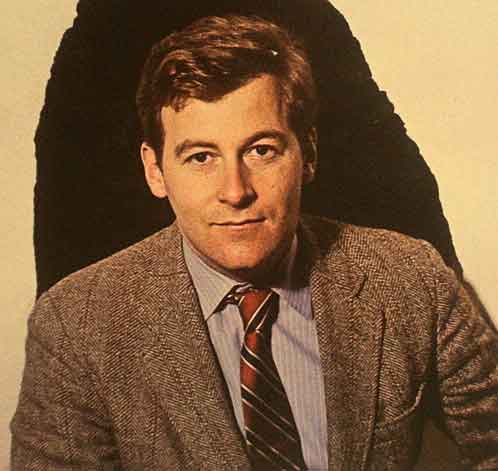
D: They mostly were! Robbie Fields, the “Posh Boy.” The English guy. He was a little bit older and he kind of made a point of standing out. He actually dressed like an Eton school attendee, and he always wore a tie and a jacket with leather patches. He kind of affected that look. Though his roots went back a little further into psychedelia and Mods. And he liked Sparks, so I think that’s kind of how he knew of us as well

When he got the tape he was very good friends with Rodney Bingenheimer. You know, Blondie and poppy stuff was fine with him. He launched “Sex Girls” on his radio show as an individual song and I think that helped Robbie when he finally met us in 1980. We did the first album which we thought was demos and then we were going to get the record deal, and then take lots of money and make the record. And Robbie was like “No, no no, you don’t understand. I like this.” And he’s like holding this cassette and he said, “and what’s more, I will put this out in like, a month. This can exist. This is great as it is.” And that was frankly, pretty new to us. So we just went for it, And it literally came out when we were overseas making the Sparks record [“Whomp That Sucker”].
So it got on the radio here in Los Angeles, big time on this station. And we weren’t around initially in the first success.
PPM: And how frustrating was that?
D: In one way it was you know, like, “oh damn,” but in another way it was like, well, people like this song and it was becoming popular. It was kind of nice to see that could happen.
PPM: Especially when you weren’t there to push it, really. You weren’t even promoting it!
D: Yeah, it was not payola. It was not a huge industry machine making it work. It was places playing it and people saying “hey, what was that?”
PPM: Organic. The interesting thing about the first record is that as you say, it was intended as demos. I call it unintentional technopop. It’s just like what Pete Shelley did when he did the “Homosapien” record,” if you’re familiar with that. Those were demos for the next Buzzcocks record that never happened. And then they said, “hey, this sounds great, let’s just put it out.”
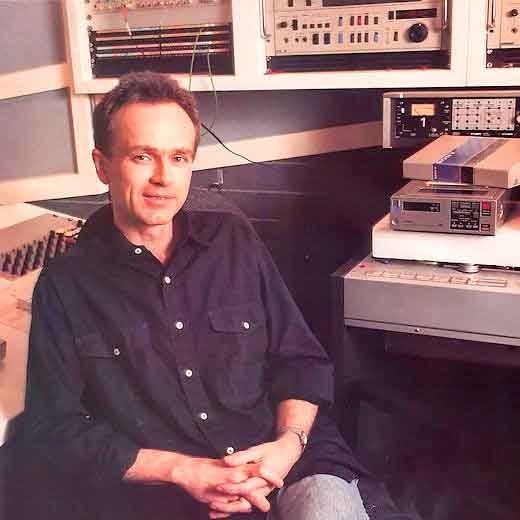
D: I know, I agree. I mean we were lucky Stephen Hague had a lot to do with the sound of the record. He ended up being quite a known producer afterwards. A constant career. He was great with sound. He was as much a sound designer as much as a synth player. I mean he could make his own sounds. And then the whole conceit of it was he came out of the guitar/bass/drums band [Jules + The Polar Bears] and frankly when I stared doing that with Les [Bohem] we wrote a couple of what I’ll call Power Pop songs, that honestly, could have been hits.
PPM: Oh yeah! I mean the first song you wrote, “The Way Marlene Moves…!”
D: Have you heard that song?
PPM: Oh yeah, I’ve heard the entire set.
D: Oh, oh… I mean to me that’s like really…
PPM: That is what Pop/Rock is all about! This is it!
D: Yeah, and it was kind of like, “well if that’s not getting us a deal then we’re just going to write whatever’s kind of going on in our heads. So that was kind of the thing. It wasn’t necessarily for a specific guitar/bass/drums format. I do a lot of writing besides just lyrics. And I don’t consider lyrics any kind of dead end at all. It could be the beginnings of short stories and anything else. A lot of time I think of lyrics as characters.
It was great and so conversely, the sounds on that, were kind of all over the place. There could be one that’s just accordion sounds.
PPM: Right…
D: No drums at all. And that was fine, yeah.
THE EARLY YEARS [Bates Motel]
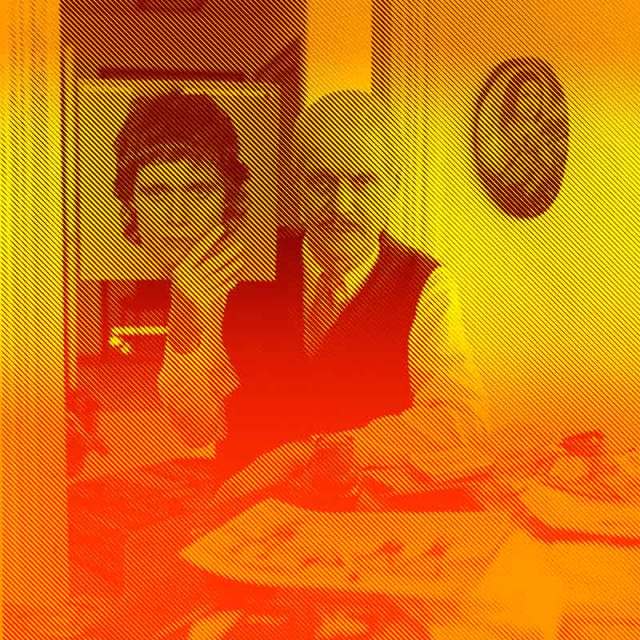
PPM: I find it interesting that you came from Chicago and the Midwest and found yourself out in L.A. when Kim Fowley called on the phone, like Destiny. That must be pretty weird, but you said you had your friend working for him so it makes perfect sense. But still, Kim Fowley is like one of those notorious, almost Satan figures in pop music! [laughs]
D: Yeah, I mean, I’m actually one of the few people who that he invested in… he sent me $150 bucks to basically get there, and he never really got that personally back [laughs] out of me so I feel…
PPM: You came out on the right side of the deal then?
D: Yeah. I would run into him all the way. Really throughout the rest of his life around town. He had this dark side for sure, but he’s an absolutely fascinating character.
PPM: Fascinating… I’d have to agree with that.
D: Between him and Rodney Bingenheimer… I owe aspects of my career to those…scenesters. Who had as much to do with the 60s in Los Angeles as the 70s so it was pretty cool.
PPM: I also find it fascinating that you started out working in early lineups of Cheap Trick, because one I hear Bates Motel, I think “oh my god, this is nirvana Power Pop here.” I can’t believe that all of those songs have only now been released because they would have been ideal for pumping into the Yellow Pills series. Even thirty years ago.
By then we thought those songs were so good and if a label decided to do a “Knack” number and “Marlene,” if it were radio pushed, there’s no question in my mind that would have been a steamroller. But the time all of that didn’t happen, we were just like “well then, let’s just write exactly about what was on our minds, because wow… something’s not aligning!” [laughs]
David Kendrick
PPM: When you’re trying to “sell out” in the best possible way, and failing, it does give one pause. How did Andrew Gold come into the picture? Because I associate him with the whole “Stephen Bishop, late 70s singer-songwriter L.A. thing.”
D: Actually, I think Les and he went to high school together.
PPM: Oh really?
D: And Les played in, before my time, right before I knew him, he was in kind of a house band that he floated in and out of.
PPM: Right. He was in the Troubadour house band, playing with Stephen Bishop and Jules Shear.
D: Yeah, Jules Shear. And Steve Hague was also working with Jules Shear. Steve Hague was a totally different, kind of more Eno-y vibe than the California singer-songwriter thing. So it was really fortuitous that we ended up doing this with him. He was just kind of able to bring a landscape to the songs…
PPM: True, true. But I have to say I thought that Andrew Gold did a great job producing those demos.
D: Oh, he did!
PPM: They sound fantastic.
D: They’re exciting songs, I still like them.
PPM: I’ve got to say that “Only The Young Die Young” and “Unexpected Overnighters…” I can’t believe that those songs weren’t written ten, twenty years earlier. Those are just genius song titles and concepts. How come no one’s written a song called “Unexpected Overnighters” before? Why, momma, why? [David laughs]
I was really impressed thought that you even tipped your hand towards country music with “Real Love” back then. This thread would show up years later, on the “Welcoming A New Ice Age” record where you’re actually doing country songs. And I thought “wow, it’s amazing…this band is not letting anything hem them in here. They’re just exploring everything.”
D: Well, I guess that the idea of Spires was to be in service to the song. Which maybe didn’t necessarily help a certain version of band coherency. I kind of route by that ethos a little bit since, in my Empire Of Fun and stuff where the subject or whatever little tangent I’m on, I’m going to see that through. If this song needs a cello, and that song – no drums. And this song we want real strings, then so be it. That’s how it’s going to be.
THE FIRST ALBUM [Songs From the Spires]

PPM: It’s interesting that I was reading in the liner notes on “While We Can” Les says that writing that song was this take one “Heroes.”
D: Yeah, I never really got that at the time. It was trying to be epic… it’s got a gorgeous melody.
PPM: I can hear a little bit of “Heroes” in that, but it’s interesting that he said that, because when I listen to “Sex Girls,” I noticed that the “Heroes” bass line pops right up in that one. [laughter] And he’s the guy playing the bass, so there you go.
I actually saw the video once for “Are You Ready For The Sex Girls.” It was 1983 and I was watching MV3. That was the one time I remember seeing the video for “Sex Girls,” which I thought was amazing the way it subverted the male role into domesticity! [David laughs] It was a beautiful role reversal that sold the irony of the song even better. I mean, I can’t imagine a better video for it.
D: Oh, thanks. The predictable video would be excruciating to think about.
PPM: Oh it is excruciating to think about and the odds were that a predictable video would be out there. So, congratulations on avoiding that.
D: We shot the “How To Get Girls Thru Hypnotism” and the “Sex Girls” video pretty close together. The same director, Doug Brown. I frankly like making pies, so it just seemed like slapping no sex, no girls in the video and just dressing the thing all up. Then Les and I are really big Film Noir buffs, and that seemed to be kind of what we were trying to angle at in the other one.
PPM: Whose idea was it to put “How To Get Girls Thru Hypnotism” out as a single? Because that’s got to be one of the darkest songs on the record?
D: Yeah, no kidding!
PPM: It’s genuinely disturbing. The video takes it into Travis Bickle territory.
D: Very much.
PPM: Whose idea was that?
D: It’s self-hypnosis.
PPM: Exactly.
D: The hilarious thing in those books…You could actually buy if you sent away for “How To Get Girls Thru Hypnotism.” You are fooling no one but yourself.
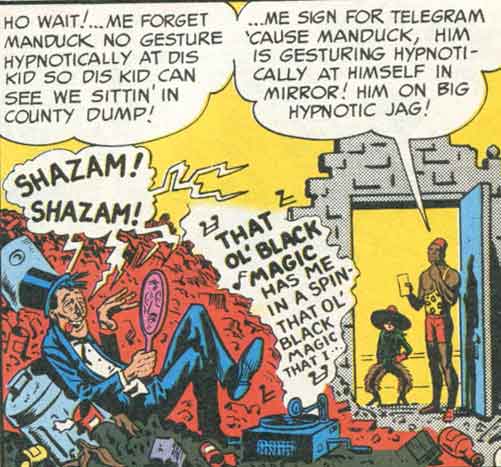
PPM: There’s an old issue of Mad Comics from the 50s where they do a parody of Mandrake The Magician and he’s hypnotizing himself, in a mirror, the whole time to make himself think he’s living this glamorous lifestyle where he’s living squalor, actually. The point of view pulls back and you actually see he’s sitting on a pile of garbage. And that was the first thing that came to mind when I heard this song. I said “oh my god, that is… wow.” [David laughs] That is strong stuff. Whose idea was the shaving of his head in the video” Did Les say “let’s do this…?” Or was it the director?
D: I think at a point we were kind of trying for the sort of doppelgänger effect where one kind of became the other… The curtain reveal…
PPM: There’s a certain point where he’s looking onto the mirror and we see you looking back, then he turned around to address the camera.
One thing I’ve got to ask you then, since you are of course, a drummer. What was it like working with rhythm boxes on what you thought were the demos where you thought you’d be recreating this on drums later. Was that difficult for you?
D: No, it was fine. I mean like we didn’t think that this was like the final end-all, be-all, necessarily but the beats weren’t played exactly as they would have been on my drums but tempos and everything, we all set all that stuff up. I mean it was still a little bit pre-Linn drum machine time. When everyone thought they were a drummer, which was utterly not the case.
PPM: I have real problems with the Linn drum era.
D: Me too.
PPM: The digital drum era, I mean… I hate ‘em. I like the original early rhythm boxes, and I liked the crude, analog drum machines. That didn’t quite sound right? They’re the ones that have character to me. And grain.
D: Yeah.
PPM: It sounded like in some cases, like “How To Get Girls Thru Hypnotism” it sounded like you were using only modular synths on that.
D: There was some… yeah. It was done different kinds of ways. There were even some pads. On the first song, “Going Hey Hey,” I played a garbage disposal!
PPM: I heard that! Because that’s in the liner notes and I thought “wow, that’s great!”
D: We had all kinds of stuff. Little hand-held things and rhythm generators. And Steve [Hague] played a lot of the keys. That was kind of him, a lot of it. He could add textures, so when we got to do the second record, we cut tracks with drums, bass, and then he was kind of able to add some keyboard stuff over it. So it was not that far away of a process that I could embellish a little bit.
I guess as a drummer, I think the thing that maybe makes me different than a lot or stand out or whatever is that I’m a lyricist too, so I’m really thinking in terms of playing to the song.
PPM: You’re thinking about emotionally selling the song itself rather than, you know…”just watch me do these fills.”
D: Having a groove going. So I like telegraphing changes and I like herky-jerk stuff. There’s songs where I’ll roll over to the next bar. I guess that’s kind of my thing.
PPM: Well, the fact that you wrote lyrics as well as Les was what I found fascinating about this because I tend to assume that “oh one guy writes the music, one guy writes the lyrics.” It’s a common band dynamic. And it’s very unusual to find the “lyrics baton” being passed back and forth as it did in Gleaming Spires, but you had such a coherent artistic point of view between the two of you it really worked out well.
D: Well, thanks. I think Les and I were both big fans of a lot of other art forms. We were avid novel and short story readers. Big film people. Les ended up being a screenwriter essentially. So there were a lot of other things going on that we wanted to address. And we both respected each other as writers. So thanks for noticing that. That was definitely a distinctive thing. I’d say we each had some obsessions… [laughs] that kind of dealt with Les in maybe more of a personal way and me in more of a covert way. Les was great at singing my words.
PPM: And the end product didn’t have any rough joins, which is great.
D: Yeah, thanks.
THE SECOND ALBUM [Walk On Well Lighted Streets]
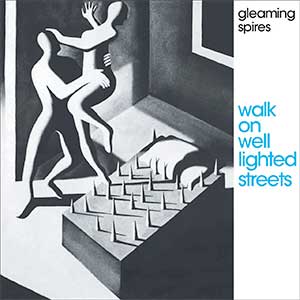
PPM: Moving onto the second album, I have to say that when I saw the Mark Kostabi “Bed of Nails” cover I thought, if that’s not the quintessence of Gleaming Spires, what is?
D: Oh my god, yeah!
PPM: It’s just like a minefield of sex and relationships and the tortuous path through it and that’s what the band is basically about as far as I can see. And you just picked that one miraculously well.
D: I saw that painting at this gallery, I think it was even in the window, and it just immediately…oh we have to, have to, have the rights to this. I saw in something you’d actually written that you actually knew a little about him as an artist.
PPM: I’m a graphic designer. [Mark Kostabi famously used a “factory” approach where he decided what his assistants would paint as his work in a particular period.]
D: He did the Andy Warhol thing where he didn’t even paint all of his stuff later. That one was definitely him.
PPM: I figured as much.
D: Everything about that… the pre-doom. It’s like you know this is coming. You’ve set this all out. Every element of it speaks volumes.
PPM: Then you’ve got songs like “You’re Right” which is just also painful and raw emotion set to the most convivial music possible. Which is one of my favorite things in the world, by the way.
D: Yeah, we were big fans of chipper music and dark lyrics.
PPM: I think you guys mastered it here, better than I’ve ever heard. And I’ve listened to music for 50 years. You even surpassed it on “Big Surprise.” That is just amazing. I’ve never heard depression described in such an upbeat, jaunty fashion. [David chuckles] Almost like a disease that you can catch through proximity. Which, of course, it is. [laughter] It’s amazing songwriting.
D: Well, thanks.
PPM: The stylistic range is always so broad, and then you start bringing in the Funk with the title track, “Walk On Well Lighted Streets.” And that’s not the only time that Funk is going to show up in this work. No matter how many stylistic changes the group goes through, it could be eight different bands but there is a consistent artistic point of view. Which is what gives it the thread of artistic continuity no matter how eclectic it gets.
Going back to Trouser Press, I remember we had the flexidiscs since I was a subscriber.

D: That was a great feature of that magazine. I had that magazine myself at the time, and we liked it. I think Sparks was in there a couple of times. The flexidisc was a marvelous invention. I liked that a lot.
PPM: That’s where I heard “Fun Type” and “Happy Boy.” I’d almost forgotten that they had done that until I heard it again. “Fun Type” was so atypical with that oscillating two note riff that was sort of like “Friday On My Mind” at a really fast tempo. I think it’s the only time you ever went that fast.
D: Yeah, I think that was probably our quickest.
PPM: So yeah, that was the one track that fit the Posh Boy brand. [David laughs]
D: It was a big jump. I mean, the first album was definitely a different side of Posh Boy. Right when he started off.
Almost every Punk band in Southern California at the time, did at least one thing with Robbie. Robbie was kind of notorious for… you know he was not the most record-keeping person and top payment kind of person. But you know, he launched a lot and was happy about that. But everyone has some little tale about Posh Boy.
PPM: If I heard about it in Orlando, Florida, something must have been happening, right? [David laughs] “Christian Girls Problems…” that’s another song title… oh my god. It’s hard to believe that it didn’t exist for years prior to you actually recording it. The downbeat intro was deceptive, but the song had so many ideas and vibes coming together to form something greater than the sum of its parts. It’s almost hard to believe that I only heard it now in the 21st century. I can’t believe that this song passed me by back then. It’s a crying shame [laughter] …because it’s the kind of thing that screams “Hit! Hit! Hit!” to me.
D: The second album got a little more national radio play and it officially came out in Canada through A+M Records there, so there was a little more play on that one. There were certainly pockets where nothing happened at all. We were essentially unknown in England, although we had a record deal in France and Germany. In France we had a little bit of notoriety because of our Sparks connection. Stuff came out there and we did press and stuff there. Like Sparks, they would have one or two places where they were known, and there were pockets here and there.
Next: …Gleaming Spires At The Movies






![Record Shopping Road Trip: Cob Records [Porthmadog, Wales]](https://i0.wp.com/postpunkmonk.com/wp-content/uploads/2024/05/cob-welsh.jpg?resize=200%2C200&ssl=1)
![Record Shopping Road Trip: Visiting Liverpool + 81 Renshaw Records [Liverpool, England]](https://i0.wp.com/postpunkmonk.com/wp-content/uploads/2024/05/liv-81-renshaw.jpg?resize=200%2C200&ssl=1)
![Record Shopping Road Trip: 58th Mega Record & CD Fair [Brabanthallen in ’s-Hertogenbosch, Netherlands] [part 2]](https://i0.wp.com/postpunkmonk.com/wp-content/uploads/2024/05/rw-icehouse-floppy.jpg?resize=200%2C200&ssl=1)
![Chris Cross: 1952-2024 [part 1]](https://i0.wp.com/postpunkmonk.com/wp-content/uploads/2024/04/chris-cross-waehrend-auftritts-ultravox-leipzig-ja.jpg?resize=200%2C200&ssl=1)
Great interview!
LikeLike
jsd – It was great to have David as the first interview here at PPM. I am the kind of person who gets excited about bands like Gleaming Spires reissues [big time] but here’s a gent who has contributed to Sparks and DEVO as well!
LikeLike
Agree, great stuff, thanks!
LikeLike
An excellent read indeed!
I will be investigating further.
LikeLike
Gavin – The debut album is fantastic, hyperkinetic technopop that should slot right into your wheelhouse. The second one was poised between what was left of the New Wave and the mainstream. The third one was super eclectic as it tried a little bit of everything in the wilderness years after New Wave was gone. Through it all the thread of continuity was the strong songwriting, and uncompromising point of view the band brought to the songs. SPECIAL UPDATE: The band have now released everything [beyond the two teaser tracks already in the posts] on Soundcloud, so I have added playable tracks to the three reviews as embeds in the relevant posts.
LikeLike